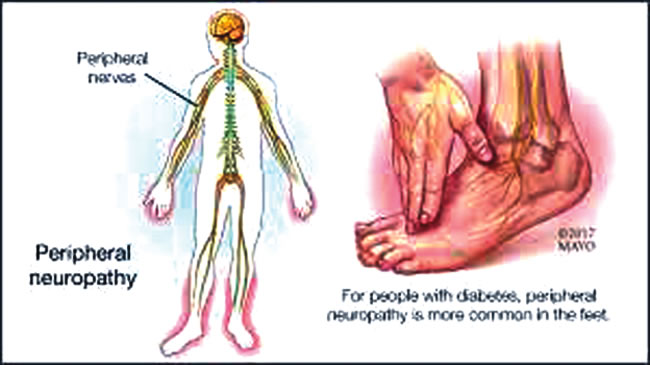Nerve damage, medically known as neuropathyis an irreversible condition that is caused by a wide range of conditions such as diabetes and even treatments like chemotherapy. It not a single health condition but rather a term used to describe a range of health problems involving damage to the peripheral nerves. And while it is irreversible, it can be prevented with simple steps bordering on diet, lifestyle, and treatment.
Neuropathy symptoms basically depend on the underlying cause and the individual. It can appear in form of temporary or permanent numbness, increased sensitivity to touch, paralysis, tingling, prickling, or burning sensation, dysfunction in organs or glands, pain, muscle weakness or wasting or impairment to urination and sexual function.
The nerve damage behind neuropathy can happen in a variety of ways, affecting the nerve axons and can have many causes including poorly controlled diabetes, shingles, chemotherapy; HIV, kidney disease, autoimmune diseases, alcoholism, nutrient deficiencies, hereditary disorders, infectious diseases, and physical trauma while in many cases, the cause remains unknown.
Where the nerve damage occurs determines the type of neuropathy: when neuropathy involves damage to only one nerve, it is called mononeuropathy, when multiple nerves are affected, it is polyneuropathy and a common type of polyneuropathy and the one most prevalent among people with diabetesis one where the first nerve fibers to malfunction are those most distant from the central nervous system, with symptoms such as pain and numbness felt symmetrically in the feet, and then traveling up the legs as the condition progresses. The upper extremities may also become involved eventually.
Correcting the underlying condition that caused neuropathy can allow nerves to recover or regenerate in some cases; getting your blood sugar under control can help halt the progression of nerve damage and improve the symptoms of diabetic neuropathy.
If that underlying cause isn’t being addressed, neuropathy can worsen. And in higher diabetic neuropathic, pain is also associated with smoking tobacco and stopping the habit may improve neuropathy symptoms. Physical therapy can help in some cases of motor neuropathies involving muscle weakness or wasting
There are a wide variety of treatments and medications for neuropathy, depending on the type of nerve damage and the severity of symptoms. Medical options include antidepressant and anti-seizure medications, surgery, nerve stimulation also known as neuromodulation as well as alternative therapies for neuropathic symptoms.
Proper nutrition is important in preventing or treating any health issues that may be at the root of neuropathy and a good start includes limiting sweets and sugar-sweetened beverages, as well as large portions of foods that are high in starches or carbohydrates. For alcoholism-related neuropathy, the best advice is to abstain from drinking to help control symptoms as heavy drinking can result in mal-absorption of nutrients such as vitamin B12, as well as cause direct poisoning of nerves.
Making fitness a part of routine can help to address the muscle weakness that some people experience with neuropathy, as well as reduce pain; regular exercise can also lower high blood sugar (hyperglycemia) in people with diabetic neuropathy,
Some causes of neuropathy, such as Charcot-Marie-Tooth disease, are hereditary and cannot be prevented b ut can be medically managed.
READ ALSO FROM NIGERIAN TRIBUNE






